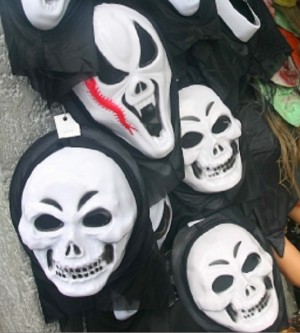MANILA, Philippines—A toxics watchdog group on Sunday issued a warning against harmful chemicals in Halloween-theme products, the effects of which would be far scarier than the “things that go bump in the night” that they portray.
While the EcoWaste Coalition noted a significant lowering of the rate of toxic chemicals detected in Halloween costumes, body and face paint, masks, decorations and candy containers, they said more than 20 percent of tested products bought from thrift shops in Manila and Quezon City still contained lead.
In 2011, the group found excessive levels of the toxic metals antimony, arsenic, cadmium, chromium, lead and mercury in 70 percent of Halloween-theme products tested and 28 percent the following year.
EcoWaste’s Project Protect coordinator Thony Dizon said in a statement: “Our investigation indicates some Halloween items are laced with health-damaging toxic metals. Instead of adding excitement and fun to the celebration, these products may in fact endanger the children’s health.”
He added: “While welcoming the significant drop in the number of tainted Halloween products this year compared to the sampling we did in 2011, we remain apprehensive about the continued sale of items with undisclosed toxic ingredients that can get on children’s hands or end up in their mouths.”
In its tests of 90 products bought for P20 up to P200 from small shops, department stores and bargain malls in Manila and Quezon City, 20 of the samples were found through the use of an X-ray fluorescence spectrometer to contain high concentrations of a toxic metal.
The potent neurotoxin lead, at levels way over the 90-parts per million (ppm) limit, was detected in 18 products. The highest lead content of 3,987 ppm was found in a spider horror decoration, while 2,730 ppm of lead, 1,425 ppm of chromium and 440 ppm of arsenic were detected in a green pumpkin pail. A rainbow wand had 1,119 ppm of lead, while a pair of Halloween party eyeglasses with a skull design contained 241 ppm of the toxic metal. A mask with a protruding eyeball registered 226 ppm.
The World Health Organization classifies lead among the 10 chemicals of major public health concern. The WHO said that exposure to lead at high levels affects the brain and central nervous system.
The WHO further said: “At lower levels of exposure that cause no obvious symptoms and that previously were considered safe, lead is now known to produce a spectrum of injury that causes loss of cognition, shortening of attention span, alteration of behavior, dyslexia, attention deficit disorder, hypertension, renal impairment, immunotoxicity and toxicity to the reproductive organs,” adding that the effects are permanent, irreversible and remain untreatable by modern medicine.
Dr. Bessie Antonio, Philippine Society of Clinical and Occupational Toxicology vice president and a pediatrician, had earlier said that children were more vulnerable to harm from toxic substances because they consumed more food and water and inhaled more air per unit of body weight compared to adults.
